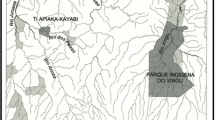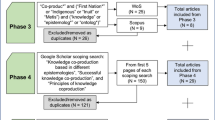Abstract
Indigenous people who are still connected to traditional lifestyles and are living closely in touch with nature’s patents, remain custodians to vast treasures of knowledge. The ability to tap on indigenous inventions can be useful within a contemporary context in providing insights to help solve emergent problems such as global warming and climate change. This research focuses on exploring ways to capture this implicit and tacitly held knowledge among these remote indigenous communities of Sarawak, Borneo. Engaging with the local community in exploring the immense challenge requires a participatory model for eliciting innovative expressions across time and space boundaries. Mechanisms to associate such discovered knowledge within the context of current scenarios requires a standard framework for achieving the alignment. In this paper, a TRIZ-based framework for connecting to and mapping these past innovations has been proposed. The 40 inventive principles of Genrich Altshuler has been adopted as a means of bridging knowledge gaps and connecting the diverse knowledge forms. The collection of customized TRIZ instruments served as a collaborative visual knowledge mapping framework for acquiring and organizing knowledge for local indigenous communities. This study has demonstrated the ability to unlock tacit knowledge amongst community knowledge-custodians living in remote and isolated communities. The 40 Inventive Principles served not only as an index for innovative expressions but also as a good platform for these communities to make systems innovation as a way of life, and also to acquire expertise from external sources. The continuing efforts in knowledge-based activities has a potential for expansion to be used by other communities. Despite the initial challenges where there was a need to address language and intergenerational gaps, the proposed model has also demonstrated interest amongst youths to connect to their roots and share the past inventive moments with community elders.
Access this chapter
Tax calculation will be finalised at checkout
Purchases are for personal use only
Similar content being viewed by others
References
Altshuller, G.: 40 principles: TRIZ keys to innovation, vol. 1. Technical Innovation Center, Inc. (2002)
BorneoTalk: Beautiful Sounds of Bamboo. BorneoTalk, vol. 52, pp. 76–77 (APR–JUN 2019) 1 April 2019
Davies, M.: Knowledge-explicit, implicit and tacit: philosophical aspects. Int. Encycl. Soc. Behav. Sci. 13, 74–90 (2015)
George, F., Kulathuramaiyer, N., Bala, P.: Fostering a TRIZ-based grassroots innovation among penans. In: MYTRIZ Conference, vol. 6, no. 7, p. 185 (2020)
Grant, K.A.: Affective Collections: Exploring Care Practices in Digital Community Heritage Projects (2020)
Järvensivu, T., et al: Helping local innovation ecosystems to become custodians of global sustainability. In: The XXIV ISPIM Conference-Innovating in Global Markets: Challenges for Sustainable Growth Conference (2013)
Johannessen, J.A., Olsen, B., Olaisen, J.: Aspects of innovation theory based on knowledge-management. Int. J. Inf. Manag. 19(2), 121–139 (1999)
Koizumi, M., Mamung, D., Levang, P.: Hunter-gatherers’ culture, a major hindrance to a settled agricultural life: the case of the Penan Benalui of East Kalimantan. Forests, Trees Livelihoods 21(1), 1–15 (2012)
Mamo, D. (ed.) The Indigenous World 2021, 35 th edn. International Work Group for Indigenous Affair (2021)
Needham, R.: The system of teknonyms and death-names of the Penan. Southwest. J. Anthropol. 10(4), 416–431 (1954)
Needham, R., Beidelman, T.O.: Penan friendship-names. Transl. Cult.: Essays EE Evans-Pritchard 117, 203 (1971)
Puri, R.K.: Hunting knowledge of the Penan Benalui of East Kalimantan, Indonesia. University of Hawai'i at Manoa (1997)
Puri, R.K.: Transmitting Penan basketry knowledge and practice. In: Understanding Cultural Transmission: A Critical Anthropological Synthesis, pp. 266–299 (2013)
Russo, D., Spreafico, C.: TRIZ 40 inventive principles classification through FBS ontology. Procedia Eng. 131, 737–746 (2015)
Survival International: The Penan. Survival International. https://www.survivalinternational.org/tribes/penan. Accessed Jan 2022
Swiderska, K.: Consent and conservation: getting the most from community protocols. In: IIED Briefing Paper-International Institute for Environment and Development, no. 17137 (2012)
Yu, P.K.: Traditional knowledge, intellectual property, and Indigenous culture: an introduction. Cardozo J. Int. Comp. Law 11(2), 239 (2003)
Acknowledgements
The authors are greatly thankful for the project funding from Ministry of Higher Education (Kementerian Pengajian Tinggi) and Formulation of TRIZ-based Sustainability-Oriented Innovation Model for Indigenous Knowledge Management (I03/FRGS/2009/2020). The authors would also like to thank the community leaders, local champions, and villagers for sharing their indigenous knowledge.
Author information
Authors and Affiliations
Corresponding authors
Editor information
Editors and Affiliations
Rights and permissions
Copyright information
© 2022 IFIP International Federation for Information Processing
About this paper
Cite this paper
Mintu, T.G., Kulathuramaiyer, N., George, F., Leong, J.P.C. (2022). TRIZ-Based Approach in Capturing and Managing Indigenous Innovation and Knowledge. In: Nowak, R., Chrząszcz, J., Brad, S. (eds) Systematic Innovation Partnerships with Artificial Intelligence and Information Technology. TFC 2022. IFIP Advances in Information and Communication Technology, vol 655. Springer, Cham. https://doi.org/10.1007/978-3-031-17288-5_20
Download citation
DOI: https://doi.org/10.1007/978-3-031-17288-5_20
Published:
Publisher Name: Springer, Cham
Print ISBN: 978-3-031-17287-8
Online ISBN: 978-3-031-17288-5
eBook Packages: Computer ScienceComputer Science (R0)





